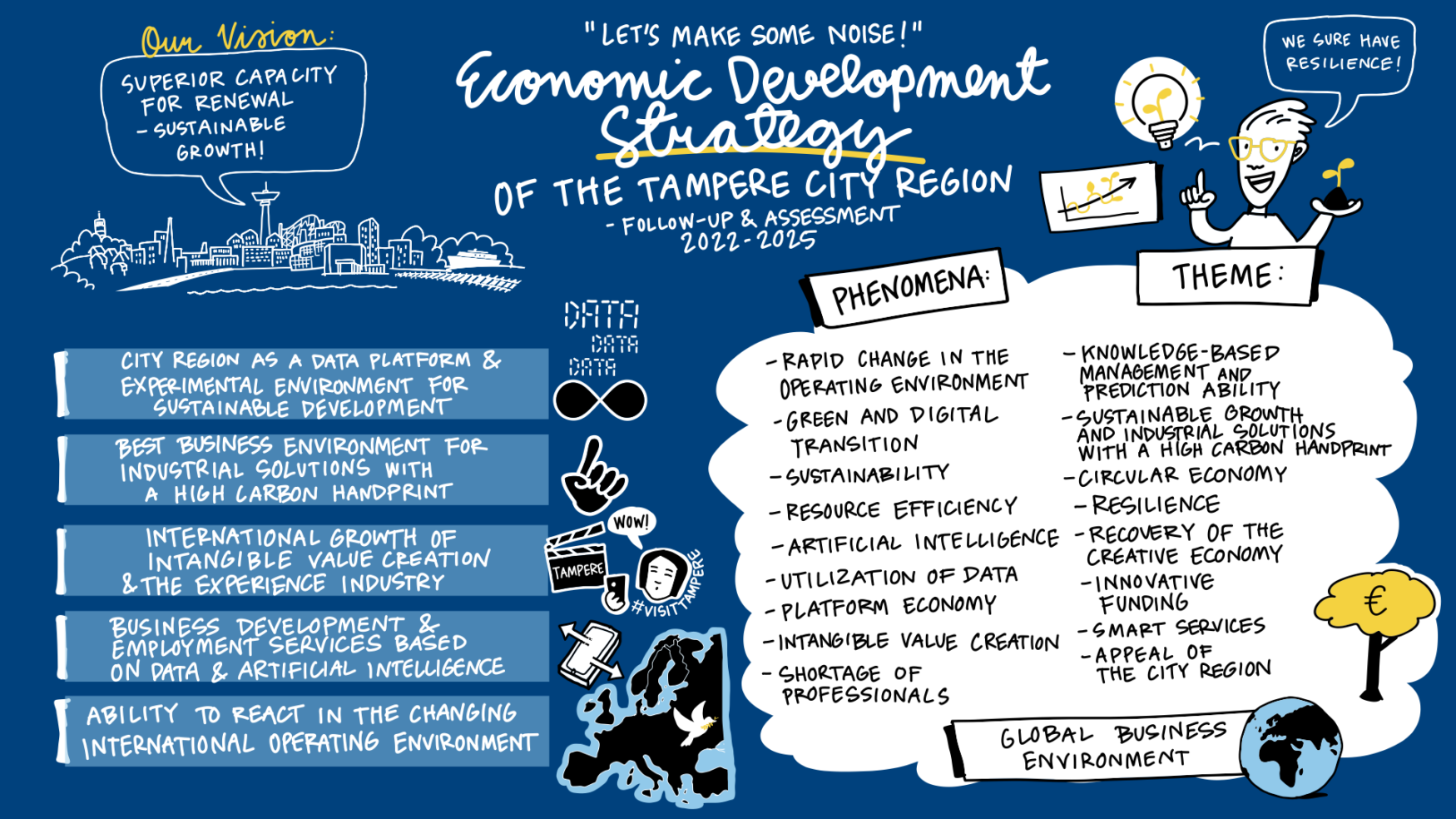The economic development strategy of the Tampere city region was completed at the end of 2019. The joint vision of the economic development strategy of the Tampere city region until 2025 is “Superior capacity for renewal – sustainable growth”. The vision will be realised by achieving the objectives of the best business experience, attractive industrial growth platform, strengthening the capacity for renewal and innovation as well as sustainable growth and competitive economy. The objectives will be implemented in practice through eight focal points.
In 2022, in the middle of the strategy period, the business environment is different in many ways compared to the end of 2019. When the strategy was adopted, it was agreed that its timeliness and effectiveness would be assessed midway through the period. The needs for updating were identified and the strategy was assessed on the basis of self-assessment and development goals through document analyses, interviews and an online survey between November 2021 to March 2022 under commission by Business Tampere. The process involved approximately 50 representatives of companies and business organisations.
The interviews and survey results show that the economic development strategy is still considered to be up to date. The strategic objectives and focal points are seen to have been translated into practical activities, and the strategy is estimated to have a fairly high or evolving effectiveness. Although the need for a significant update is not seen, it is necessary to ensure that the city region’s economic development strategy is in line with the EU-level, national and regional strategy guidelines.
Since 2019, the business environment in the Tampere city region has changed in many ways. The biggest changes are the developments in world politics and their repercussions on the markets, the two-year COVID-19 pandemic and, most recently, the Russian invasion of Ukraine, the sanctions imposed on Russia by the West as a result of the war and Russia’s counter-sanctions and measures. They have a wide impact on the local business environment.
The important role of the green and digital transition is reflected in the EU-level, national, provincial and regional strategic guidelines. The importance of data economy and responsibility has been highlighted. The legislative environment is constantly evolving. The new EU digital regulations aim to increase the integrity of the European data market, to guide market developments in a direction consistent with the EU’s values and to balance competitive positions in relation to China and the United States. From a technological point of view, the pandemic has accelerated the digital leap. Technology is becoming embedded in everything.
The policies of the region and the City of Tampere emphasise the importance of the experience economy. National policies also identify the specific need for recovery in the sector following the pandemic restrictions. Intangible value creation offers new opportunities for international growth in the digital world of experience. The need to address the shortage of professionals arises in the national programmes, City of Tampere strategy and interviews. After the establishment of the wellbeing services counties, the new vitality role of municipalities emphasises the importance of economic development services under the responsibility of municipalities.
The new regional strategy, which will be completed in summer 2022, envisages a future transition to 2040, in which the main messages will be based on an enchanting everyday life, smart growth and activities open to the world. Ecologically sustainable growth and the global business environment will become common themes with the economic development strategy.
The vision and strategic objectives are still up to date, but the rapid change in the business environment requires the region’s business operators to be more resilient and the focal points to be updated. The supplementary guidelines have been summarised in five themes:
- City region as a data platform and experimental environment for sustainable development
- Best business environment for industrial solutions with a high carbon handprint
- International growth of intangible value creation and the experience industry
- Business development and employment services based on data and artificial intelligence
- Ability to react in the changing international operating environment
